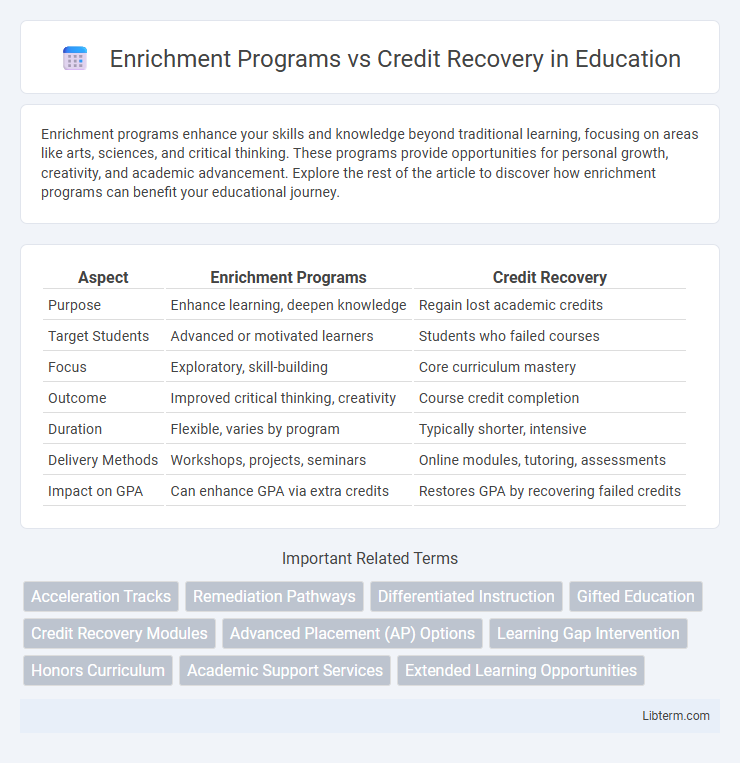Enrichment programs enhance your skills and knowledge beyond traditional learning, focusing on areas like arts, sciences, and critical thinking. These programs provide opportunities for personal growth, creativity, and academic advancement. Explore the rest of the article to discover how enrichment programs can benefit your educational journey.
Table of Comparison
| Aspect | Enrichment Programs | Credit Recovery |
|---|---|---|
| Purpose | Enhance learning, deepen knowledge | Regain lost academic credits |
| Target Students | Advanced or motivated learners | Students who failed courses |
| Focus | Exploratory, skill-building | Core curriculum mastery |
| Outcome | Improved critical thinking, creativity | Course credit completion |
| Duration | Flexible, varies by program | Typically shorter, intensive |
| Delivery Methods | Workshops, projects, seminars | Online modules, tutoring, assessments |
| Impact on GPA | Can enhance GPA via extra credits | Restores GPA by recovering failed credits |
Understanding Enrichment Programs
Enrichment programs offer students opportunities to explore advanced concepts beyond the standard curriculum, fostering critical thinking and creativity in subjects like STEM, arts, and humanities. These programs emphasize personalized learning experiences, allowing students to develop skills that enhance academic motivation and intellectual growth. Unlike credit recovery, which focuses on helping students meet minimum requirements to graduate, enrichment programs aim to deepen knowledge and stimulate academic curiosity.
What Is Credit Recovery?
Credit recovery is an educational strategy designed to help students who have failed or missed credits in specific courses to regain those credits and stay on track for graduation. It typically involves tailored, flexible instruction and assessments that target the student's deficits, enabling them to master essential skills and content. Unlike enrichment programs, which aim to enhance learning beyond grade level, credit recovery focuses on remediation and ensuring students meet minimum academic standards.
Key Differences Between Enrichment and Credit Recovery
Enrichment programs provide students with opportunities to deepen their knowledge and skills beyond standard curriculum, promoting advanced learning and critical thinking. Credit recovery focuses on helping students who have failed courses to regain lost credits, enabling them to meet graduation requirements on time. The key difference lies in enrichment fostering academic growth and engagement, while credit recovery primarily addresses remediation and credit attainment.
Target Student Audiences
Enrichment programs primarily target gifted and high-achieving students seeking academic challenges beyond the standard curriculum, aiming to deepen knowledge and develop advanced skills. Credit recovery programs serve students who have fallen behind in their coursework due to failures or absences, focusing on helping them regain lost credits and stay on track for graduation. Both programs cater to distinct student needs, with enrichment fostering extension and exploration, while credit recovery emphasizes remediation and academic recovery.
Academic Goals and Outcomes
Enrichment programs enhance academic goals by providing advanced learning opportunities that deepen subject mastery and foster critical thinking skills. Credit recovery focuses on helping students meet graduation requirements by retaking and mastering previously failed courses to maintain academic progress. Both approaches improve outcomes by addressing diverse student needs, with enrichment promoting academic excellence and credit recovery ensuring course completion and timely graduation.
Program Structures and Formats
Enrichment programs typically feature flexible, student-centered formats that emphasize deepening knowledge through project-based learning, interactive workshops, and exploratory modules designed to enhance skills beyond standard curricula. Credit recovery programs follow a structured, competency-based approach with clearly defined timelines and assessments aimed at helping students regain lost credits efficiently. Both program types often utilize online platforms and blended learning models to accommodate diverse student needs and scheduling constraints.
Benefits of Enrichment Programs
Enrichment programs offer personalized learning experiences that foster critical thinking, creativity, and advanced skill development beyond standard curricula, promoting academic excellence and lifelong learning. These programs enhance student engagement by providing opportunities for exploration in areas of interest, which can lead to improved motivation and self-confidence. Unlike credit recovery, enrichment programs focus on deepening knowledge and broadening intellectual horizons, resulting in holistic educational growth.
Advantages of Credit Recovery Initiatives
Credit recovery initiatives provide students with tailored opportunities to regain academic credits without falling behind their peers, enhancing graduation rates and reducing dropout rates. These programs accommodate diverse learning paces and styles, offering flexible scheduling and personalized instruction to address specific academic gaps. By enabling timely completion of required courses, credit recovery supports continuous student progress and promotes educational equity.
Choosing the Right Path for Students
Enrichment programs provide opportunities for advanced learning and skill development, enhancing students' academic growth beyond standard curricula. Credit recovery offers a structured approach for students to make up missed or failed coursework, ensuring they stay on track for graduation. Selecting the right path depends on the individual student's academic needs, goals, and readiness for either accelerated learning or remediation.
The Future of Supplemental Education
Enrichment programs enhance student learning by offering advanced or supplementary content that fosters critical thinking and creativity, positioning students for future academic and career success. Credit recovery focuses on helping students make up missed credits to meet graduation requirements, ensuring timely completion of education and bridging learning gaps. The future of supplemental education integrates technology-driven personalized learning pathways, blending enrichment and credit recovery to optimize individual student growth and achievement.
Enrichment Programs Infographic

 libterm.com
libterm.com